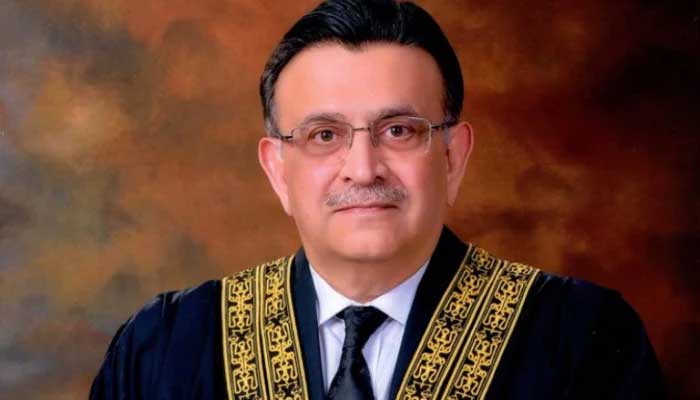Only court can issue declaration under Article 62(1)(f), remarks CJP Bandial
CJP Bandial says PTI leader Faisal Vawda renounced US nationality after submitting nomination papers in 2018
ISLAMABAD: Chief Justice of Pakistan Umar Ata Bandial on Thursday remarked that only the court can issue a declaration under Article 62(1)(f), which sets the precondition for a member of the Parliament to be "sadiq and ameen" (honest and righteous), and nobody can be called “dishonest” without examining the evidence.
CJP Umar Ata Bandial issued the remarks while hearing a plea filed by PTI leader Faisal Vawda, in which he challenged his lifetime disqualification by the Election Commission of Pakistan (ECP) over filing false nomination papers.
During the course of the proceedings, Justice Bandial stated that PTI leader and former federal minister Faisal Vawda renounced his US nationality after submitting the nomination papers for the 2018 election.
The PTI leader had moved the Supreme Court against the ECP, stating that the electoral body is not a court of law and cannot disqualify him for life.
A three-member bench of the SC, headed by CJP Bandial and comprising Justice Mansoor Ali Shah and Justice Aisha Malik, heard the case.
“It is not easy to disqualify someone for life. Court declaration means to record evidence,” the CJP said, adding the apex court had set standards for the implementation of Article 62(1)(f) in its previous judgments.
At this, Vawda’s counsel Wasim Sajjad said that Article 63 is attached in case of dual nationality and the lawmaker can only be unseated, not disqualified for life.
Earlier, Sajjad argued before the court that neither did his client hide any facts nor was he "dishonest".
At this, Justice Mansoor asked when did Vawda submit his nomination papers.
The counsel said that he submitted the nomination papers on June 7, 2018, while the scrutiny was conducted on the 18th of the same month.
“When did Faisal Vawda submit the affidavit?” asked Justice Mansoor. In response, the counsel said that it was submitted on June 11.
He added that the returning officer was informed that Vawda had renounced his US citizenship.
“On which date did you go to the American Embassy and cancel your nationality?” asked Justice Aisha.
Vawda’s counsel, without giving the date, said that his client went to the US Embassy and said that he was renouncing his nationality.
“Did you go to the embassy and verbally tell them to cancel your passport?” Justice Mansoor asked.
To which, the counsel said, his client was not supposed to give proof of renouncing citizenship.
At this, Justice Mansoor said, “you did not bother to conclude this issue before submitting the affidavit on June 11.”
“NADRA issued the certificate of renunciation of US citizenship on May 29, 2018,” Wasim Sajjad said.
“When you did not go to the embassy, then how did NADRA issue the certificate?” asked Justice Ayesha, and said that at the time of submitting the affidavit, Vawda's US citizenship was not cancelled.
The real question is the declaration of lifetime disqualification, which cannot be given by the ECP, Sajjad said.
Meanwhile, the court adjourned the hearing till October 16.
-
Security forces gun down 30 terrorists in multiple IBOs in KP: ISPR
-
MQM-P calls for new province in Sindh
-
US report validates Pakistan military edge over India: PM
-
Banned TTP poses serious threat to Pakistan security: UNSC panel
-
CM Afridi clarifies remarks on by-poll after ECP requests army deployment
-
Dubai sees 3.2m Pakistani passengers in 2025 as airport sets new milestone
-
Security forces kill 23 Indian proxy terrorists in KP's Kurram
-
Pakistan to construct island to boost oil exploration: report












